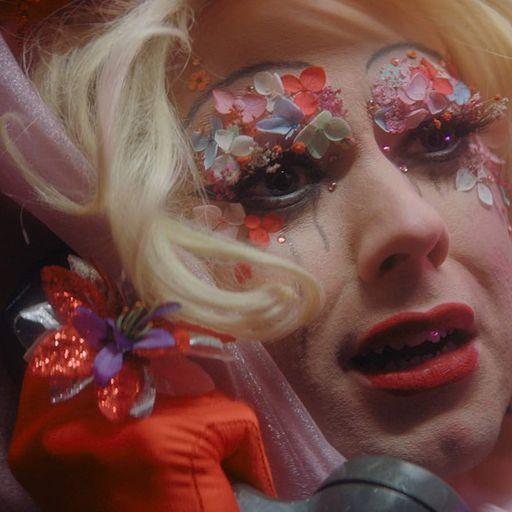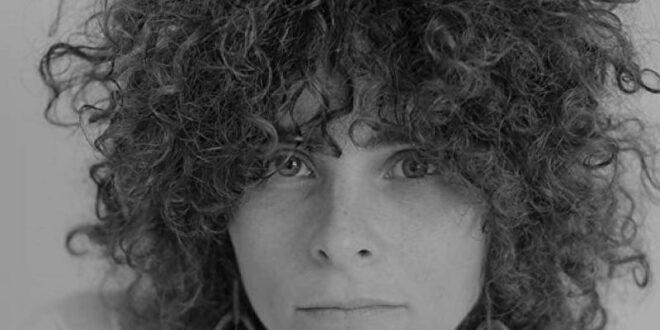Every so often, there comes a film that is so captivating and so thrilling that I just have to speak with the filmmaker if I can. When selecting which films I wanted to view for this year’s North Bend Film Festival, Amanda Kramer’s flashy, neon-drenched, genderqueer drama, Please Baby Please, was my first choice. With a stacked cast including Andrea Risborough, Harry Melling, Demi Moore, and the always mesmerizing Karl Glusman, Please Baby Please is nothing like what you expect. It’s hip, ultra-modern, and an adventure in storytelling. It drips sex, lust, yearning, and the never-ending quest to find yourself.
I was lucky enough to chat with Amanda, and we discussed her vision for the film, what inspired the story, queer representation in cinema, and more!

PopHorror: I really enjoyed Please Baby Please. I went in totally blind except for the cast, and I think that was the best way to do it. It was really surprising, and I like that a lot.
Amanda Kramer: Thank you.
PopHorror: Karl Glusman is captivating as always.
Amanda Kramer: I love when people call Karl out. I think he’s absolutely divine and fantastic in it.
PopHorror: He was my selling point. Once I saw he was in it, I knew I had to see this.

Amanda Kramer: Oh, I’m so happy to hear that! Okay, good. He’ll be happy to hear that, too.
PopHorror: I’m a huge Gaspar Noé fan, so I thank him for introducing me.
Amanda Kramer: Same.
PopHorror: So, what inspired the story, and how did the project come about?
Amanda Kramer: I was dating someone, and we were experiencing a little crisis of gender faith as far as presenting feminine and masculine roles. That’s definitely a generalization! But it was providing a very cool position for me inside a union to swing between the butch and femme. It was exhilarating to write about what that feels like, and I was, as always, reveling in my obsession with a particular cinema past… John Waters, Kenneth Anger, Peter Greenaway, Rainer Werner Fassbinder, the phenomenal work of Julian Temple, all mashed with films from the 1950s, Marlon Brando interviews, photos of James Dean.
PopHorror: I love that you mentioned James Dean, because he is my favorite actor.
Amanda Kramer: Is he really?
PopHorror: Yes! Since I was in junior high.
Amanda Kramer: I love him. Though I’m never sure what he’s doing. When I watch him act, I can’t tell if it’s good or bad by traditional standards, which is fascinating. It’s like he’s aping something that is too odd to pinpoint. He’s infinitely unknowable. One wonders what it would have been like if he had stayed alive and was still making movies in the 1970s and 80s. It might have been profoundly bizarre.

PopHorror: Yes! I have seen the word “genderfluid” thrown about. I was reading some reviews of your film. I feel like he would have been the perfect embodiment of that had he been of this time. Even back then, I would use that word for him, too. I really love that he was an inspiration.
Amanda Kramer: I think Rebel Without a Cause has a poignant homoerotic subtext. It’s an amazing performance of Dean’s masked identity. His histrionics in that movie! He’s like Faye Dunaway. He’s sexy and stunning and flinging himself all over the screen. It’s high melodrama, which remains so cool.
PopHorror: How did you convey your vision of the film to your cast and crew?
Amanda Kramer: Any time I cast an actor, I try to explain right away that I’m an expressionistic director. I always prefer the surreal or unreal to the real. I like to play with theatrics, and I’m deeply hoping for something that I think people would call over-the-top. However, I don’t find that to be pejorative in any way. I think over-the-top is exactly where you want to be. I’m interested in stylistic acting… acting by extreme choice, not guided by subtlety and nuance. You discuss with actors the level everyone must meet at. There are many incredible filmmakers who require this. The Coens, Todd Solondz, certainly early Tim Burton. It’s finding a singular tone and getting every collaborator at the same pitch. You have to do that with your crew, too. You have to describe, “Oh, we’re not going to mimic the cutesy kitschy poodle skirt 50s thing with the ponytails. We’re attempting an extreme style of high hair and bold makeup.”

We’re going to take inspiration from the ’80s as well, an era that hysterically swirled other eras into that era’s pop explosion. I say straightforwardly, “If you think you want to play or design this character realistically, you might be working on the wrong film.” I don’t think of characters as people. I think of them as symbols of people. I want to try something wild and outer-human, instead.
PopHorror: It was really cool to see Harry Melling in a role like this, because I’m not going to lie, I only know him from Harry Potter. I don’t think I’ve seen him in anything else, so this was quite a departure. I love it when actors do something that is totally out of the wheelhouse and something you wouldn’t expect.
Amanda Kramer: Harry is one of those people where you want to see him do it all. I imagine it’s part of an English tradition. He’s such a brilliant theater actor, a Shakespearean actor, but is also so funny and broad when he wants to be. I find his performance in this to be so sensitive and humorous, emotionally available, and heartbreaking, so tender. I love his scenes.

PopHorror: It really was great. This film has been called a stylish queer thriller. How do you feel about queer representation in cinema?
Amanda Kramer: It’s such an expansive description that encompasses – now – any film focused on characters in the LGBTQ and growing community. So as a genre, it’s no longer what its roots embodied, which was more of a punk, fucked-up aesthetical fantasia into vibes of dreaminess, overt sexuality, or pure outsider culture. This fringe aspect of queer filmmaking is highly influential on my work, because it’s so boundary-breaking in its essence.
It’s like the origins of house music, an underground attitude celebrating how unseen/unheard it is by the mainstream world. I’m obviously inspired by that. I think what’s happening now is simply that more amazing, specific, inclusive human stories are available. Queer filmmaking is ever-expanding because audiences are more tolerant and open-hearted and minded. Thank heavens for that.
PopHorror: Yes, I agree, and I love that more films like this one are showing in festivals and becoming more seen. I like that representation is growing.

Amanda Kramer: Even straight people are exhausted by gender norms. We’re all tired of it. Most of us just want to be honest with ourselves. That’s what Suse and Arthur are going through in the movie. They are a heretofore straight couple who are awakened and enlivened by sudden passion and violence and the flexible characteristics of masculine and feminine energy. I think that’s something happening in a lot of people’s homes and lives right now.
PopHorror: I just have one last question for you today. What is your favorite scary movie?
Amanda Kramer: Der Fan. It’s gorgeous and truly shocking.
Thank you so much, Amanda, for taking the time to speak with us. Please Baby Please is currently in its festival run, and was recently bought by Music Box Films, with plans for a theatrical release the fall.
 PopHorror Let's Get Scared
PopHorror Let's Get Scared




